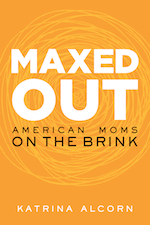I just stumbled across an interesting story about the term ‘nervous breakdown‘ that came out in The New York Times last year. It explains why the term fell out of favor decades ago with psychiatrists, who now prefer labels like ‘anxiety disorder,’ ‘depression,’ or ‘schizophrenia’ when diagnosing patients.
But the term ‘nervous breakdown’ is still quite useful to describe a profound physical and emotional reaction to stress, even if it makes our doctors bristle.
The problem with a term like ‘anxiety disorder,’ (which, by the way, will affect 28% of us at some point in our lives) is that, while it may accurately describe one’s symptoms, in essence it says, You are crazy. It doesn’t take into account the absurd, even inhuman demands on our time and energy. It doesn’t take into account that
- We’re working longer hours, with less leisure time and fewer social connections than previous generations.
- We’re chronically sleep-deprived. In the first two years, most parents accumulate a “sleep debt” of five months or more.
- Three-fourths of employees believe today’s worker has more on-the-job stress than a generation ago.
‘Nervous breakdown,’ in contrast, is more hopeful. It describes an event, rather than a pathology, which is perhaps why that term persists. It is at once serious and yet, just vague enough—Were there hospitals involved? Drugs? Drama?—that it preserves an air of mystery.
The term ‘nervous breakdown’ leaves room for the idea that, sure, we may be crazy, but we live in a crazy world. It implies a long-awaited catharsis, an internal act of rebellion against the status quo.
But if you don’t like the term ‘nervous breakdown,’ there are alternatives. I present them to you now, in alphabetical order:
Adrenal exhaustion: If you don’t want to talk about the emotional side of a nervous breakdown, then you can stick with something like ‘adrenal exhaustion’ which focuses on a specific physical cause. It has a reassuring ring of authority to it, and lacks the ball-and-chain implication of a term like ‘depression.’ If depression is lupus, adrenal exhaustion is a really bad cold. Or something like that.
Americanitis: A breakdown caused by the acceleration of American life, coined by William James, the 19th-century philosopher. (And to think, they didn’t even have Twitter, 24-hour fitness, IM, smart phones, or Starbucks drive-thru then!)
Burnout syndrome: The term du jour of European psychiatrists to describe the symptoms of “vital exhaustion.” (See “vital exhaustion” below.)
Crackup: As defined by F. Scott Fitzgerald when writing about his own nervous breakdown. This quote is from his 1936 essay called “The Crack-Up”:
…the test of a first-rate intelligence is the ability to hold two opposed ideas in the mind at the same time, and still retain the ability to function. One should, for example, be able to see that things are hopeless and yet be determined to make them otherwise…
Spiritual awakening: This is by far the most optimistic term of the bunch. Unfortunately, as soon as the words “I had a spiritual awakening” leave your lips, you transform into a New Age hippy freak. Especially if you live in California.
Totally, completely exhausted: This was what I first told people when I went home sick from the job I’d had for six years and never went back. Since then, I’ve heard two other women use this exact same phrase “totally, completely exhausted” to explain why they suddenly, with no warning, needed to take a leave of absence from their jobs. It is probably the most socially acceptable of all the ways one can describe a nervous breakdown, because it reduces a complete physical and emotional crisis to a need for more sleep.
Vital exhaustion: The thing European psychiatrists see in their patients before diagnosing them with ‘burnout syndrome.’ (According to the Times article, there are three types: “frenetic,” “underchallenged,” and “worn out.” Sound familiar?)
I still think ‘nervous breakdown’ is the best term to describe what happened to me when I became (temporarily) unable to work. I don’t mean to glamorize nervous breakdowns. I think anyone who can avoid having one should. But if you have had one, or think you’re about to, take heart. You’re in great company, including writer Joan Didion (in the photo above), chess player Paul Morphy, actress Gene Tierney, Beach Boy Brian Wilson, Comedian Richard Pryor, and scientist and mathematician Sir Isaac Newton. All crazy people living in a crazy world.
* * *
Lately I’ve been posting about once a week to the blog. If you don’t want to miss a post…
Subscribe by email | Stay connected on Facebook | Twitter






{ 11 comments… read them below or add one }
Fascinating stuff about language and culture. I’m doing a lot of thinking about the subject since I’m navigating an unfamiliar city in Brazil. Today I realized that “to experience” and “to experiment” are the same word in Portuguese, which says something about the daily experience/experiment for sure!
You know, family lore has it that my father met my mother after he had a “nervous breakdown” and took time off from college … It certainly sounded like a great family mystery. But I never could get anyone to describe what ACTUALLY happened. Did he foam at the mouth one day on the quad and get carried away in a straight jacket? Did he drink himself into oblivion and have to get sprung from the dry out cell? What? Moreeover, he was a single, white, well educated male in the early 60’s. He shoulda been at the top o the world right? Your post has revived my curiosity about what went down with him … And helps me understand my own experiences with “Sudden Onset Spiritual Enlightenment” — I think the sudden onset enlightenment is the one that makes you sit down in your tracks and move not one more inch. Slow on-set lets you re-allign your life to fit your new understanding of the world. Sudden means that you now understand what is important — and it aint any of the things you’ve been breaking your back for …
Bless you Katrina!
@ Kat Yes, exactly. We bring our cultural biases to every experience without realizing it most of the time.
@ Jennifer C. That’s a great point. Sudden change vs. slow change. I guess I’m a sudden change kind of gal…I want to know what happened to your dad, too.
“The 19th-century philosopher William James reportedly called neurasthenia, from which he claimed to suffer himself, “Americanitis,” in part the result of the accelerating pace of American life.”
Ah, William James. I really do like him. And, as you point out, little did he know … But he seems to have a point of view similar to yours, which is that it’s not quite that something isn’t quite right with us, but rather that something isn’t quite right with this world we’ve created for ourselves. And I agree.
‘Americanitis’ is great! I had that but called it ‘burnout’. I was able to quit my job and cruise for a bit after it did me in. It was fantastic and another reason I am in favor of sabbiticals.
Very interestingly, I got pregnant super-fast after I quit my job. We were not trying but had thought our high-failure rate type contraception we had used for 4 years was working! But I think that it was my body that was not working properly.
The world is far more imperfect than we are! Let’s fix it 🙂
I love your definitions Katrina. Now that my kid is 7, I feel like I’m coming out of an extended period of vital exhaustion, as indicated by the fact that I am now able to read a complete book. My mind is my own again, more or less, and complete exhaustion is no longer a contstant state.
I’m with you Katrina, nervous breakdown really strikes a chord with me – it makes me feel like the world just got so crazy, it pushed me over the edge. this was definitely the feeling that working and raising kids inspired in me. now being home and “just” raising kids (and writing and cleaning and cooking and running all of the household financials), i’m feeling more “vital exhaustion”. i’m beginning to think we all need to chuck it and move to a tropical island with no internet access…
I love this post about semantics and language (I’m a poet, so this ain’t surprising!). When I think about the words I most often use to describe why I’m about to leave my tenured job and move to the country and live on one income, I think the terms I use most often are “hit a wall,” as in, “we just hit a financial, emotional, and spiritual wall with two incomes and parenting two young children” and “dropping out,” as in, “we’re dropping out of the mainstream culture and the standard pace so we can get back some sanity.”
“Dropping out” of course has a total hippie vibe, but hey, I don’t mind that!
I feel like “burnout” sounds really self-blaming, like you did something wrong. I love “Americanitis,” because it puts the responsibility back on the culture and the institutions, where I think it belongs! I don’t feel like I’ve had a nervous breakdown, because I mostly feel like I’ve seen the light, not drowned in the misery (though “drowning” is also a term we use a lot to describe our current life…also, “barely keeping our heads above water.” Also, “in survival mode.”). So yeah, that makes me realize that another term I use a lot is “clarity,” as in “I now have the clarity to see that we don’t like our lives the way they are now. Now how to implement our new vision?”
Love and strength to all in this struggle,
Arielle
All good additions to our nervous breakdown nomenclature, Arielle.
I suppose one’s term of choice also depends on how bad things got before we made a change. I think some of you guys were better at seeing the writing on the wall than I was…
I had a nervous breakdown yesterday at work. There really is no better way to describe being pushed so far that you simply cannot stand, cannot stop crying, cannot cope. Call it whatever you want, it’s a crisis of the psyche and it sucks.
Americanitis – perfect description for the chronic condition that I have which causes periodic nervous breakdowns.
{ 1 trackback }